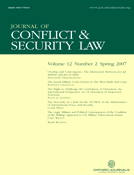The International Economic Law Interest Group of the
American Society of International Law has issued a call for papers for a research forum on "Risk, Science and Law in International Governance." The conference will take place at the Chicago-Kent College of Law, Chicago, IL, December 5, 2009. Here's the
call:
International law in the 21st century has increasingly responded to and been challenged by domestic measures which aim to address various health risks. A number of different international organizations and instruments engage the intersection of science, risk and law. These include the World Health Organization, the Conference of Parties of the Convention on Biological Diversity, the World Bank, and the World Trade Organization with its Agreement on the Application of Sanitary and Phytosanitary Measures (SPS). It also includes the jurisprudence that the WTO has spurred, such as the EC-Hormones and ECBiotech cases. Recent investment cases such as Canadian Cattlemen for Fair Trade v. United States, under NAFTA’s investment chapter suggest that these issues extend to international investment and perhaps other areas. Scholars have accordingly studied the relation of risk regulation, science, law and international governance from various disciplinary perspectives, including political science, economics, sociology, psychology, philosophy, and law.
The International Economic Law Interest Group (IEcLIG) of the American Society of International Law (ASIL) will host a special Research Forum in early December 2009 to discuss the emerging complexities and interconnectedness of risk, science and law as they relate to international governance. The conference will take place at Chicago-Kent College of Law in Chicago, IL on December 5 (Saturday), 2009. We invite the submission of proposals in the form of abstracts of no more than 300 words which will address this topic. Here is an illustrative list of potential topics, although you should feel free to submit any paper topic relevant to this field of study.
- What is the role of the Codex Alimentarius Commission, International Plant Protection Commission, World Animal Health Organization and the WHO/FAO regarding risk regulation and the role of science? How do their processes work? How have they developed? What is the role of epistemic scientific communities?
- What role do transgovernmental regulatory networks play? How have they developed?
- How have concerns terrorism risks (such as through the use of biologic agents) affected domestic risk regulatory policy? How should they?
- What role can informal, soft-law oriented bodies play, such as the WTO SPS Committee or those provided by standard organizations, in resolving disputes?
- How should WTO adjudication be informed by risk science? What criteria are and should be used (if any)? What should be the role of the precautionary principle? How should one conceive it?
- How have international dispute settlement bodies used science to resolve regulatory disputes? What deference has and should be given to states?
- Does (and should) culture and ethics play a role in addressing risk disputes? For example, what should there role be when addressing disputes involving biotechnology, cloning or animal rights?
- What leverage do studies of the philosophy of science and science and technology provide us in addressing international governance issues regarding risk regulation? What insights does behavioral economics offer, such as regards availability heuristics and social cascades, in dealing with transnational risk disputes?
- How should we conceive of the issues of participation, accountability and administrative procedure regarding risk regulation in a globally interdependent world?
- What is the (desirable) role of civil society and NGOs in addressing risk disputes before international tribunals?
- How do “development” issue relate to disputes over risk regulation? What approaches have and should be considered to address development concerns?
- What linkages are there between trade, investment, anti-trust and any other regulatory areas on these issues?
- What causal mechanisms explain developments in international governance over risk regulation? What has been their impact within state practice? How should international governance over risk regulation be reformed?
- Any other question of relevance to the subject.
Abstracts should be emailed to Sungjoon Cho at scho1@kentlaw.edu by September 15, 2009. Each submission should include the author’s name, institutional affiliation, contact information and e-mail address. Selected papers will be announced by September 30, 2009. Working drafts should be submitted by November 15, 2009 to be circulated among the forum participants. Presenters will be exempted from the forum fee. A limited number of partial stipends to help cover travel costs may be available to help defray travel and accommodation costs.
 The latest volume of the Irish Yearbook of International Law (Volume 2, 2007) is out. Contents include:
The latest volume of the Irish Yearbook of International Law (Volume 2, 2007) is out. Contents include:







 Stefano Manacorda (Seconda Università degli Studi di Napoli - Law) & Adán Nieto (Universidad de Castilla-La Mancha - Law) have published
Stefano Manacorda (Seconda Università degli Studi di Napoli - Law) & Adán Nieto (Universidad de Castilla-La Mancha - Law) have published 





 Christoph H. Schreuer (Universität Wien - Law), with Loretta Malintoppi (Eversheds LLP), August Reinisch (Universität Wien- Law), & Anthony Sinclair (Allen & Overy LLP), have published the second edition of
Christoph H. Schreuer (Universität Wien - Law), with Loretta Malintoppi (Eversheds LLP), August Reinisch (Universität Wien- Law), & Anthony Sinclair (Allen & Overy LLP), have published the second edition of 
 Michael Rötting has published
Michael Rötting has published 







